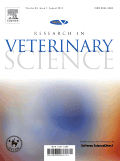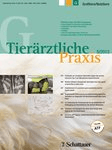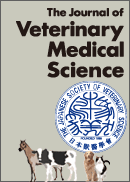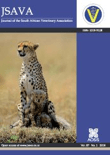
BERLINER UND MUNCHENER TIERARZTLICHE WOCHENSCHRIFT
Scope & Guideline
Pioneering Research for a Healthier Animal World
Introduction
Aims and Scopes
- Veterinary Education and Training:
The journal emphasizes the importance of veterinary education, exploring key competencies and training needs for future veterinarians in Germany. - Animal Health and Disease Management:
It covers various aspects of animal health, including the detection, prevention, and management of diseases in both companion and livestock animals. - Antimicrobial Resistance and Public Health:
The journal frequently addresses issues related to antimicrobial resistance in veterinary medicine, highlighting its implications for public health and food safety. - Animal Welfare and Ethics:
A core focus is on animal welfare, including studies on husbandry practices, welfare assessments, and ethical considerations in veterinary care. - Zoonotic Diseases and One Health:
Research on zoonotic diseases, their transmission from animals to humans, and the interconnectedness of animal and human health is a significant theme. - Innovative Veterinary Practices and Technologies:
The journal promotes the adoption of new methodologies and technologies in veterinary practices, including diagnostic tools and treatment protocols.
Trending and Emerging
- Interdisciplinary Approaches to Veterinary Medicine:
There is a rising trend in interdisciplinary research, linking veterinary science with public health, environmental science, and ethics, promoting a holistic view of animal and human health. - Focus on Antimicrobial Stewardship:
The journal is increasingly highlighting studies related to antimicrobial resistance and stewardship, emphasizing the urgent need for responsible antibiotic use in veterinary practices. - Innovations in Animal Welfare Assessment:
Emerging themes include the development of new methodologies for assessing animal welfare, reflecting growing societal concerns regarding animal treatment and welfare standards. - Veterinary Education Reform:
With an evolving landscape in veterinary education, there is a marked increase in discussions regarding curriculum improvements and training methodologies to better prepare future veterinarians. - Zoonotic Disease Surveillance and Control:
The journal is placing greater emphasis on zoonotic disease surveillance, reflecting heightened awareness of the risks posed by zoonoses, particularly in light of recent global health crises.
Declining or Waning
- Traditional Veterinary Practices:
There is a noticeable decrease in publications focusing on traditional veterinary practices, possibly due to the increasing integration of modern technologies and evidence-based approaches in veterinary medicine. - Specific Disease Outbreaks:
Research specifically centered on localized disease outbreaks has decreased, as broader and more systemic approaches to animal health and disease control gain prominence. - Wildlife Veterinary Medicine:
Although still relevant, studies exclusively focusing on wildlife health and management appear less frequently, possibly overshadowed by a greater emphasis on companion animals and livestock.
Similar Journals

RESEARCH IN VETERINARY SCIENCE
Transforming Animal Care Through Groundbreaking StudiesRESEARCH IN VETERINARY SCIENCE, published by Elsevier Science Ltd, stands as an authoritative platform in the field of veterinary studies. With its origins dating back to 1965, this prestigious journal is recognized for its contribution to the advancement of veterinary knowledge and practices, boasting a remarkable Q1 categorization in Veterinary (miscellaneous) and ranking 24th out of 194 in the Scopus veterinary general category, placing it in the top 13% of its field. The journal presents a diverse range of research articles that explore critical topics in veterinary science, thereby facilitating evidence-based practices and innovations. Although currently not an open-access journal, it remains highly accessible through institutional and personal subscriptions, allowing researchers, professionals, and students to benefit from its rich collection of studies. As it moves toward 2024, RESEARCH IN VETERINARY SCIENCE continues to be a vital resource for those dedicated to improving animal health and advancing veterinary science.

TIERAERZTLICHE PRAXIS AUSGABE GROSSTIERE NUTZTIERE
Exploring the intersection of research and practical veterinary applications.TIERAERZTLICHE PRAXIS AUSGABE GROSSTIERE NUTZTIERE is a pivotal journal in the field of veterinary science, focusing specifically on large animals and food production animals. Published by GEORG THIEME VERLAG KG, this journal has been a resource for veterinary professionals since its inception in 1996, delivering current research and practical insights to its readership through 2024. Despite its classification in the Q4 quartile for both Food Animals and Veterinary (miscellaneous) categories, the journal provides an essential platform for emerging studies, contributing to the interdisciplinary dialogue around veterinary practices. Researchers and practitioners benefit from the journal’s commitment to advancing knowledge, despite its modest rankings in Scopus where it stands at rank #150 in General Veterinary and #32 in Food Animals. While not currently offering Open Access options, the journals’ significant body of work remains an invaluable asset for those dedicated to enhancing animal health and welfare. TIERAERZTLICHE PRAXIS serves as a cornerstone for academic exploration and practical application in the veterinary field, fostering a deeper understanding of the complexities involved in animal care and management.

Open Veterinary Journal
Empowering Global Veterinary Research and CollaborationOpen Veterinary Journal, published by the University of Tripoli, Faculty of Veterinary Medicine, offers a vital platform for the dissemination of research in the field of veterinary sciences. With an ISSN of 2226-4485 and an E-ISSN of 2218-6050, this journal has been committed to open access since 2011, allowing for unfettered access to its content, which ensures that researchers, practitioners, and students worldwide can benefit from the latest veterinary research findings. Operating from Libya, it has garnered an important position within the academic community, achieving a Q2 quartile ranking in the scope of veterinary (miscellaneous) and maintaining a Scopus rank of 104 out of 194 within the general veterinary category, indicating its growing influence and reach. The journal focuses on a diverse array of topics pertinent to contemporary veterinary practice, aiming to bridge gaps in knowledge and foster collaboration among scholars and practitioners. As it continues to publish original research and reviews, Open Veterinary Journal stands as a crucial resource for advancing veterinary medicine, supporting innovative research, and enhancing educational outcomes within the profession.

REVISTA CIENTIFICA-FACULTAD DE CIENCIAS VETERINARIAS
Unlocking insights for a sustainable future in veterinary science.REVISTA CIENTIFICA-FACULTAD DE CIENCIAS VETERINARIAS, published by the Universidad del Zulia, is a prominent open-access journal dedicated to advancing the fields of veterinary science, animal science, and food science. Since its inception in 1997, the journal has served as a vital platform for disseminating quality research and fostering academic dialogue among professionals and scholars in the veterinary and agricultural sectors. With its commitment to open access since 2010, the journal aims to make valuable research freely accessible to a global audience, thereby contributing to the advancement of scientific knowledge. Although currently categorized in the bottom quartile of various fields—including Animal Science and Zoology, Food Science, and Immunology—REVISTA CIENTIFICA-FACULTAD DE CIENCIAS VETERINARIAS is dedicated to nurturing innovative research that addresses pressing challenges in veterinary and related sciences. Researchers, professionals, and students will find this journal to be an important resource for quality studies that have implications for animal health, food safety, and biotechnology in the context of Venezuelan and international landscapes.

JOURNAL OF VETERINARY MEDICAL SCIENCE
Pioneering Insights for Veterinary Professionals Worldwide.JOURNAL OF VETERINARY MEDICAL SCIENCE, published by the Japan Society of Veterinary Science, serves as a critical platform for advancing the field of veterinary medicine. With an ISSN of 0916-7250 and E-ISSN of 1347-7439, this journal covers a broad spectrum of topics relevant to veterinary science, publishing original research, reviews, and case studies that contribute to the scientific knowledge base and clinical practice. Recognized for its quality, the journal has achieved a Q2 ranking in the Veterinary (miscellaneous) category for 2023, placing it within the top 35% of journals in its field as per Scopus rankings. With a convergence of years spanning from 1991 to 2024, it reflects a rich history of scholarly contributions. Researchers, professionals, and students engaged in veterinary science will find valuable insights and advancements within its pages, significantly supporting their work and enhancing veterinary practices globally. The journal is located at the University of Tokyo, and while it does not currently offer open access, it remains an essential resource in veterinary medical literature.

BMC Veterinary Research
Advancing veterinary science through open access.BMC Veterinary Research, published by BMC in the United Kingdom, stands as a pivotal open-access platform dedicated to advancing the field of veterinary science since its inception in 2005. With an impressive impact factor that reflects its influential presence, this journal has achieved a remarkable ranking of #17 out of 194 in the Scopus Veterinary category, placing it in the 91st percentile among its peers. The journal serves as an essential resource for researchers, professionals, and students alike, fostering the dissemination of high-quality research and innovative practices within the veterinary and broader medical communities. With its commitment to open access, BMC Veterinary Research ensures that valuable insights are accessible to all, promoting collaboration and knowledge sharing that drive the advancement of veterinary sciences. As it continues to publish significant findings until 2024, it remains a key contributor to the contemporary discourse on animal health and welfare.

Journal of the South African Veterinary Association
Your Gateway to Cutting-Edge Veterinary DiscoveriesJournal of the South African Veterinary Association is a prominent Open Access journal dedicated to advancing the field of veterinary science since its inception in 1945. Published by MEDPHARM PUBLICATIONS PTY LTD, this journal stands out with an impactful HIndex and a commendable categorization in 2023, ranking Q3 in Medicine (miscellaneous) and Q2 in Veterinary (miscellaneous). With a Scopus rank of 96 out of 194 in the veterinary field, it serves as an essential resource for researchers, veterinary professionals, and students, promoting the dissemination of high-quality research and knowledge. The journal offers a platform for peer-reviewed articles covering diverse topics relevant to veterinary and animal health issues, encouraging expansive dialogue and collaboration within the academic community. Based in Centurion, South Africa, and accessible globally since it adopted an Open Access model in 1997, the journal exemplifies a commitment to accessibility and the sharing of knowledge.

Journal of the Hellenic Veterinary Medical Society
Fostering collaboration for a healthier future in veterinary medicine.Welcome to the Journal of the Hellenic Veterinary Medical Society, a premier platform dedicated to advancing the field of veterinary medicine through high-quality research and scholarly discourse. Published by the Hellenic Veterinary Medical Society, this journal serves as a vital resource for veterinarians, researchers, and students who are committed to the advancement of animal health and welfare. With an ISSN of 1792-2720 and a recognized status in the community, the journal publishes impactful studies that contribute to the understanding of various veterinary disciplines. Although the journal currently sits in Q3 of the Veterinary (miscellaneous) category with a Scopus ranking of #157/194, it aims to elevate its reach and impact within the scientific community, fostering a culture of innovation and knowledge sharing. The journal strictly adheres to open access principles, ensuring that its findings are readily available to all, thereby promoting collaboration and comprehensive learning. By participating in this esteemed journal, authors and researchers contribute to the rich history and ongoing dialogue of veterinary science that dates back to its founding in 1953. We invite you to explore, engage, and contribute to the growing body of knowledge in veterinary medicine.

Revista de Investigaciones Veterinarias del Peru
Advancing Veterinary Science for a Healthier TomorrowRevista de Investigaciones Veterinarias del Peru, published by UNIV NACIONAL MAYOR SAN MARCOS, stands as a pivotal resource within the field of veterinary sciences. With its ISSN 1682-3419 and E-ISSN 1609-9117, this journal aims to publish innovative research contributing to the advancement of veterinary practices and animal health. Since its inception in 1999, it has fostered an academic platform for professionals and researchers alike to share findings that are crucial for understanding and improving animal welfare in Peru and beyond. Although currently positioned in the Q3 category of Veterinary (miscellaneous) and ranked #163 out of 194 in the Scopus database, the journal's commitment to quality research and open access to veterinary knowledge continues to attract submissions and readership from a diverse audience. As it moves forward into 2024, the Revista de Investigaciones Veterinarias del Peru remains dedicated to disseminating critical insights that promote evidence-based practices in the veterinary field, stimulating further research and collaboration across continents.

Slovenian Veterinary Research
Advancing Veterinary Science Through Open AccessSlovenian Veterinary Research, published by the University of Ljubljana, serves as a significant platform for the dissemination of research within the veterinary field. With an ISSN of 1580-4003 and an E-ISSN of 2385-8761, this open-access journal has made its content freely available to the global research community since 2021, enhancing accessibility and engagement. The journal's scope includes a diverse range of topics relevant to veterinary science, aiming to foster innovation and collaboration among researchers, professionals, and students in the field. Although currently categorized in the Q4 quartile for veterinary studies, the journal is committed to improving its impact and visibility, particularly as it converges on its upcoming years of operation from 2007 to 2024. As it strives to elevate its Scopus ranks, currently positioned at rank #162/194 in General Veterinary, Slovenian Veterinary Research provides a vital resource for advancing knowledge and best practices in veterinary medicine. For anyone interested in the latest veterinary research trends and findings emanating from Slovenia and beyond, this journal represents an essential source of information.